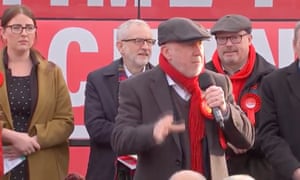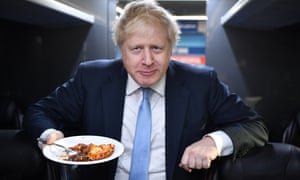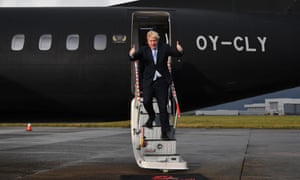Thanks for all your questions
Our political team will answer any questions you have about the election results on Friday at 12.30pm.
You can ask your question via our form here.
A few more questions from readers below:
Q: Will the Fixed-term Parliaments Act mean that we can expect all elections to be winter elections from now on or will that act be done away with should Boris get a majority? Avi Smith, 55, Yorkshire
Both the Conservatives and Labour have vowed to scrap the FTPA if they win a majority. Regardless, elections default to May under the act so the next election is unlikely to be December again.
Q: Some former Tories are running their campaign as independents because they were expelled from the party. How are they faring overall and do they have a chance? It seems to me that in all the electoral reports their campaigns have been a bit overlooked. F Spaak, 40, PR consultant, Twente, the Netherlands
They are quite unlikely to win because all of them are running in seats with huge Tory majorities but some surveys suggest they could come second.
Q: For those of us who have to work on Friday so need to sleep but also want to catch exciting election moments live, do you have any advice on whether it’s best to stay up late or get up early? Any specific times to look out for? Chloe, 50, self-employed, Bristol
It depends how excited you are and able to cope with sleep deprivation. The exit poll published at 10pm will give a good steer about the result. But to be sure which way the result is going you probably would need to stay awake for the first bellwether seats in the early hours of the morning. It will be clear by then whether the Tories are making gains in Labour’s northern heartlands that would give them a majority. By 6am, it should be obvious who has won or whether it looks like a hung parliament unless there really is only a few seats in it.
Updated
Just over 15 minutes left to ask any questions you may have on the general election. Send them in to us here.
Q: Are elderly voters less likely to come out and vote in a cold, December election and could this affect the result? Danny, Amsterdam
We won’t have much recent past data as general elections are usually in May. The conventional wisdom is that winter elections hurt Labour because their traditional voters are less likely to own a car, but this seems outdated. If it were to snow, it seems more likely this would affect the Tories, whose voters are older, and whose “get out the vote” operation is weaker than Labour’s.
Q: This election has seen a rise of dirty tactics and dishonesty from most of the parties, especially the Conservatives. These include the the fake Fact Checking incident, false smears of other parties and all the lies within adverts on Facebook etc. How can this be allowed and how come not more is being done about this? Andrew, senior designer, London
Election laws are seriously wanting when it comes to advertising and social media use. It is essentially the Wild West as there is no regulation of it. It is illegal for people to make false statements about candidates but not for parties to present misinformation. The problem is that the winning party in an election has little incentive to make better laws.
Updated
You have been sending in your questions about the general election which I will be answering until 1.30pm. You can share your questions with us via our form here.
Q: 326 is the target number of seats for a majority, but it is generally accepted it can be a bit lower than this for a party to still have a working majority. What is the minimum number of seats the Conservatives can have and still realistically expect to govern without having to rely on other parties? Martin, 29, lecturer, Wirral
The Conservatives need around 320 seats because the DUP are unlikely to play ball because of Johnson’s Brexit deal that creates a border down the Irish Sea. No other parties are keen to work with them either. There are 650 MPs – around seven Sinn Fein who do not take up their seats and four non-voting speakers. Half of that is 319.5 so the Tories are aiming for 320 as their magic number.
Q: To what extent could young voter turnout sway the election result? Alice, 23, working in tech, Brussels, Belgium
It could be crucially important. Last time, Labour took Canterbury off the Tories in a shock result attributed to the student vote. Younger voters could make the difference in Labour targets such as Putney and Chingford. Different polls have different predictions for turnout among each age group which partially accounts for wildly varying leads for the Tories of between six and 15 points.
Updated
Some of your questions so far have been about the Green party and what will happen on 1 February:
Q: On the subject of getting Brexit done, the PM says we will come out of the EU on 31 January, but what will actually be different on 1 February? For the ordinary person, and for businesses? Bill Muskett, 66, retired, Cheshire
It will mostly be a symbolic exit as the UK will still be in transitional arrangements meaning trading relationships, free movement and links to EU institutions remain until the end of 2020 at least. Johnson has insisted a new immigration system and EU trade deal will be ready by then. If not, he can seek an extension to transition or face a cliff-edge where the UK would trade on WTO terms.
Q: Why has the Green party failed to make much impact in this election given the success of XR and acceleration of the climate breakdown? Steve, 57, lecturer, Southend
All the smaller parties have been squeezed in this election as the choice between Boris Johnson and Jeremy Corbyn is so stark that voters seem to be making decisions based on who they would rather see as prime minister.
We’re now on stop two of Jo Swinson’s tour of London and commuter-belt marginals, in Guildford – where the decision of former Tory MP Ann Milton to stand as an independent could split the Conservative vote tomorrow.
The Lib Dem leader was in a small, packed room in a village hall, where she gave assembled activists much the same message as she had half an hour down the road in Horsham – in such a volatile election, getting out the vote matters hugely.
Swinson told me at the last stop that she was hopeful the Lib Dem ground game, buoyed by local election gains in May and a record-high membership, could be crucial.
She also said she would enjoy a nervy election night all the more if tactical voting saw the Lib Dems eject some high-profile Brexiter MPs (she began the day in Dominic Raab’s seat): “I think it’s fair to say that would certainly be the case.”
Peter Walker
(@peterwalker99)Stop two of Swinson’s last-day bus tour and we have another gathering of local activists in another car park – this time in Guildford, where the Lib Dems hope the decision of ex-MP Ann Milton to stand as an independent could split the Tory vote. pic.twitter.com/wqatKhIGi3
Peter Walker
(@peterwalker99)Swinson is now addressing the local activists in a tiny village hall. This through-a-window view was the closest I could get amid the massed camera crews. pic.twitter.com/s0XzOFOWeV
Updated
I’m Rowena Mason, deputy political editor for the Guardian, and I will be answering any questions you have on the general election today. I have written about Westminster politics for eight years, covering three elections and two referendums. During this election, I have been tracking the Tories since Boris Johnson’s first stump speech in Birmingham.
If you have a question you can send it to us by filling in the form here.
A last-minute push for tactical voting has seen one Lib Dem candidate in a highly marginal seat effectively endorse his Labour opponent, advising local people to support him to avoid the constituency falling to the Conservatives.
In a series of tweets, Brendan Devlin said that while he could not support either Labour or Jeremy Corbyn, the incumbent Labour MP, Paul Williams, was “an honest, sincere man, and if I needed help, I know he’s reliable and committed to social justice”. He added:
To be crystal clear: vote tactically for someone who cares about the NHS and social care. Those are important in Stockton South.
Brendan Michael William Devlin
(@BrendanDevlin50)To be crystal clear: vote tactically for someone who cares about the NHS and social care. Those are important in Stockton South.
The 2017 election saw Williams defeat the Conservatives by just 888 votes, but polling for Thursday’s election puts the Tories marginally ahead.
Stockton South is one of the seats being highlighted by Vote for a Final Say, an anti-Brexit campaign group which is urging people to vote tactically, and has called for a series of Labour and Lib Dem candidates to step aside where polling suggests they are in third place in a marginal constituency – with Devlin among them.
Updated

















